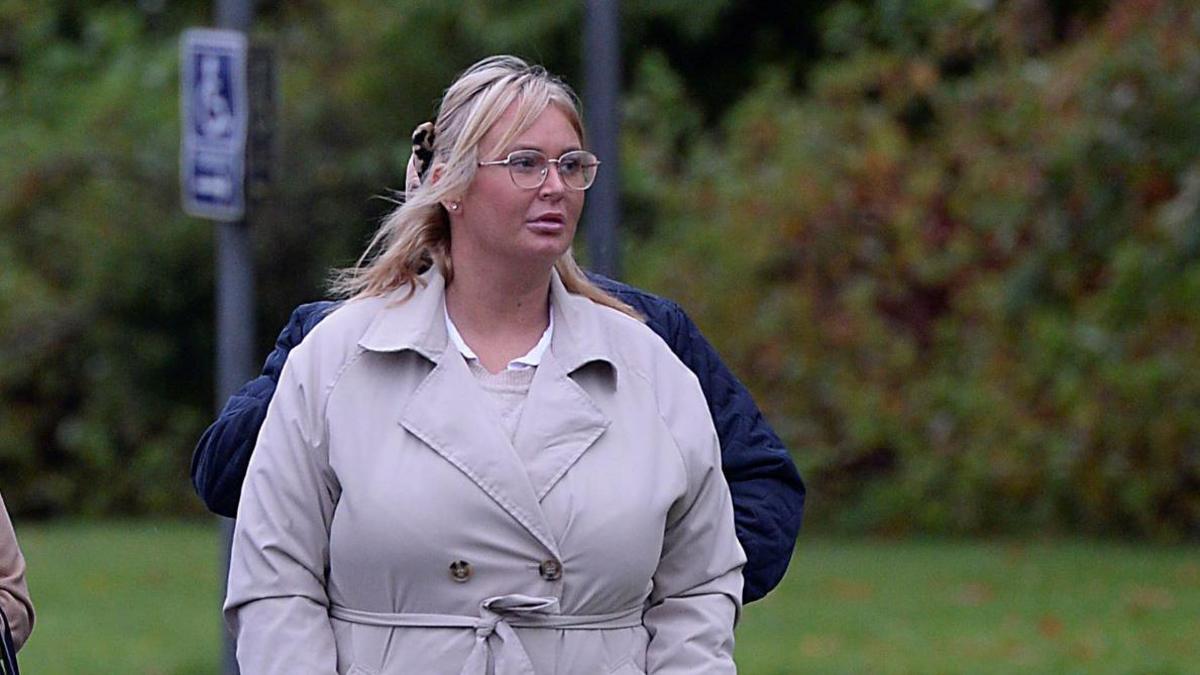Murder accused lived 'in chronic fear' of partner, says doctor

The court heard that McIlwaine and Crossley's relationship was "toxic"
- Published
The trial into the death of a man who was killed in a knife attack has heard psychiatric evidence into the mental health of the woman who killed him.
On Thursday, the jury at Coleraine Crown Court listened as the defence brought forward two doctors who spoke with Julie Ann McIlwaine, 33 of Hazel Close, Lagmore in west Belfast, after she killed her partner James Joseph Crossley, 38.
She admits causing his death but denies that she murdered him at her former home in Filbert drive in Dunmurry on the 2 March 2022.
The court heard that their relationship was “toxic” and she was “pathologically attached” to him.
'Chronic fear'
Psychiatrist Dr Christine Kennedy spent eight hours talking with Julie Ann McIlwaine about her relationship with the victim and what happened the night of the stabbing.
She told the court that Julie Ann McIlwaine was “living in chronic fear of James Crossley”.
She said the relationship was one of psychological control with abuse and serious mental and physical violence.
Dr Kennedy told the court that only a small percentage of abusive relationships end with a woman killing a man and that for it to happen while the man is asleep or incapacitated is “rare”.
A barrister for the prosecution took the doctor through the events on the night James Crossley was stabbed saying that the actions of Julie Ann McIlwaine were “rational”.
That she left the bedroom and went down two flights of stairs to choose the biggest knife in the kitchen before returning upstairs to the bedroom and moving their 10-month-old baby who was on the bed beside a sleeping Mr Crossley.
Dr Kennedy agreed saying that they were “all good choices, logical thinking.”
When pushed on if there was any evidence of a "loss of control" she said she couldn’t answer that.
'Stress reaction'
Dr Kenny Heubert, a forensic psychiatrist, told the court that Julie Ann McIlwaine and James Crossley were in a “pathological, enmeshed and toxic relationship” and that her actions on the night of the killing could be the result of a “stress reaction”.
He also said that she did not meet the full criteria for a diagnosis of PTSD but she had been diagnosed with “situational stress” in the months before the stabbing.
In his report submitted to the court he wrote that Julie Ann McIlwaine said she loved Mr Crossley which was “a paradox which is hard to understand” but likely formed through a “traumatic bond”.
Both witnesses said that Julie Ann McIlwaine was a “poor and inconsistent historian” and that the most contemporaneous accounts of her actions were likely to be the most reliable.
The crown and the defence have both completed their evidence and the jury will be back in court next week to hear the summing ups.